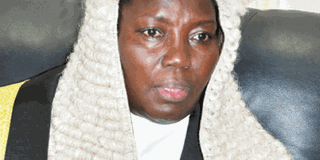Prime
Rebecca Kadaga: A woman of all political seasons

Rebecca Kadaga, the first female Speaker of Parliament. File Photo.
What you need to know:
A lawyer by training, Kadaga started her political life as a Member of Parliament 22 years ago. Today, as Speaker of Parliament, she holds the third highest office in the land, the first female to do so.
Anyone who knew Rebecca Kadaga in the early years of her career would remark at how ironic her initial aversion to relying on a government position as her road to success transformed into a 22-year-long exodus as a National Resistance Movement (NRM) politician.
When she opened Kadaga and Company Advocates in 1984 after a stint as legal assistant at Obol Ochola Law Chambers, she seemed set for a life away from government and direct participation in politics.
But, the government service she started as the Member of Parliament for Kamuli District in 1989 built up to her current position in the third-highest political office as Uganda’s first female Speaker of Parliament.
Madam Speaker
Her landslide victory of 302 votes to Nandala Mafabi’s 72 on 19th May 2011 signaled Ugandan MP’s readiness to follow her example of putting national interests above party politics. Validation for “the people’s speaker” tag came quickly.
In April 2012 when Uganda became the first East African country to host the Inter-Parliamentary Union, the world’s largest union of 159 national Parliaments, she called on NRM and non-NRM support in showcasing Uganda’s positive attributes to the visiting delegates.
But the Forum for Democratic Change (FDC) and Activists for Change (A4C) staged a walk-to-work protest during the assembly that was, in her opinion, the 9th Parliament’s contribution to Uganda’s golden jubilee celebrations. Many opined the opposition had taken advantage of her accommodative attitude.
The style with which she referees parliamentary sessions is evenhanded, a trait so unusual among party-affiliated politicians that she has publicly said she will not give in to pressure from fellow NRM party members to muzzle opposition voices.
The example of her conduct, and directly marketing a Ugandan candidate to other states helped Margaret Zziwa become a speaker at the East African Legislative Assembly. For such efforts she won an award for helping the East African integration process, and also earned the respect of most Ugandans for being the voice of reason in a Parliament fraught with political frictions.
Kadaga the fearless
Two weeks after her election, the Hansard of May 25th 2011 quoted her thus, “You know hon. Members I did not want to apply the rules strictly during this orientation. I am waiting for you to have maiden speeches before I start hitting people on the head. The whip will be later; for now let us just listen to each other.”
When the hitting began, she was accused of selectively interpreting house rules to her advantage when she initially refused to recall Parliament until MP’s stipulated the agenda for the discussion on Uganda’s oil agreements, even though they had the one-third required for reconvening.
By the time of reconvening on October 10th 2011, her argument of not meeting only to greet each other in order to save taxpayers money on MP’s sitting allowances won admiration from most Ugandans for standing her ground even when they threatened her with a censure motion.
When she instituted investigations for oil-bribe allegations on 3 ministers—Premier Amama Mbabazi, Foreign Affairs Sam Kuteesa, and Hilary Onek of Internal Affairs, it seemed like a betrayal to the party since, like them, she too was an NRM MP.
Ugandans appreciated her readiness to fight beyond lip-service what she called crisis-level corruption that cost East African member states a combined annual loss of 500billion and with 20% of government budgets being diverted for private use by officials.
That she still maintains objectivity which is a rare quality for lawyer-legislators who lose any they ever had with the deal-making and appeasement that attend the political process is another reason why many, including even opposition Attorney General Abdu Katuntu who led the reconvening-for-oil crusade, call her the “best speaker Uganda has ever had.”
Uganda’s next top leader?
Even with the hurdle of NRM primaries to jump past if she ever heeded popular opinion and vied for Uganda’s presidency come 2016, Rebecca Kadaga is being encouraged to announce her candicacy, which she told Busoga region leaders she will do only if other regions backed her up.
Consistency of objectivity in political decision-making, and social justice for grass root wanainchi, the qualities she is currently adored for position her as a viable option for female president, which many think is the elixir that will positively transform Uganda’s politics. Results of a survey conducted by Research World International from March 19th to April 6th 2012 showed 62% of respondents seconded her being Uganda’s next President. This resonated with Kabale Diocese’s Rev. Fr Gaetano Batanyenda’s assessment of her as “the best woman candidate for the presidential race come 2016.”
Whether her political career will survive the in-fighting in NRM created by such speculation, or whether the party will survive the succession debate she has been sucked into remains to be seen.
Factfile:
• Born 24th May 1956 in Kamuli to George Wilson Madali and Eve Kadaga.
• Attended Shimoni Primary School and Namasagali College
• Bachelor of Law, Makerere University (1978)
• Diploma Legal Practice, Law Development Centre (1979)
• President, Federation of Uganda Women Lawyers (1986/1989)
• Secretary General, East African Women Parliamentarians Association (1996)
• Uganda Minister for Regional Cooperation ; Africa and Middle East (1996-98)
• State Minister of Foreign Affairs for International Cooperation (1996-1999)
• Minister of State for Communication in charge of Aviation. (1998-99)
• Minister of Parliamentary Affairs (1999-2000)
• Diploma in Women’s Law (2000) and MA; Women’s Law (2003), University of Zimbabwe.
• Deputy Speaker of Parliament (2001-2011).




